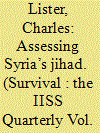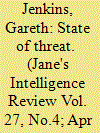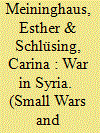| Srl | Item |
| 1 |
ID:
138611


|
|
|
|
|
| Summary/Abstract |
The conflict in Syria has changed significantly since the first signs of an armed insurgency began to emerge in late May 2011. While the largely nationalistminded Free Syrian Army (FSA) gradually devolved into an amorphous gathering of locally focused militia units with minimal command links to a leadership in Turkey, the capabilities and influence of Salafist and Sunni
jihadist groups expanded considerably.
|
|
|
|
|
|
|
|
|
|
|
|
|
|
|
|
| 2 |
ID:
139695


|
|
|
| 3 |
ID:
138612


|
|
|
|
|
| Summary/Abstract |
In the first weeks of October this year, an array of tanks waited on Turkey’s southern border, their commanders watching carefully as the Islamic State of Iraq and al-Sham (ISIS) fought to capture the nearby Syrian–Kurdish town of Kobane. The Democratic Union Party (PYD), the force defending the town and an offshoot of Turkish insurgent group the Kurdistan Workers’
Party (PKK), sought help from the powers allied against ISIS: the European Union, NATO, the United Nations, Turkey and, above all, the United States. But Ankara was reluctant to directly intervene in Kobane; it refused to allow help to reach the defenders and denied Washington permission to fly offensive operations out of the US Air Force base at Incirlik, in southern Turkey. Despite the threat that ISIS posed to the country further down the line, Ankara’s preference appeared to be for the town to fall, thereby dealing a heavy blow to the Syrian Kurds.
|
|
|
|
|
|
|
|
|
|
|
|
|
|
|
|
| 4 |
ID:
173842


|
|
|
|
|
| Summary/Abstract |
Current research on civil war neglects the effect of translocal ties on the mobilization of fighters in armed groups (AGs). Yet the Syrian war demonstrates the necessity to pay close attention to this twofold process: Analysing YPG, Hizballah and FSA networks, we argue that AGs are more likely to persist and avoid fragmentation in the long-term if they maintain strong linkages with local communities (local anchoring) and functioning linkages across different localities. We introduce here the concept of translocality to war studies, differentiating it from transnationalism. This analytical lens enables us to focus on localities within Syria, which can influence an actor’s power position in war decisively, while also being subjected to drastic change by AGs. We conclude that translocality offers insights for the study of civil war as it enables us to grasp the embedding of armed groups – or lack thereof – in local communities; differentiating between actor groups depending on their local anchoring, and observing network dynamics between different localities.
|
|
|
|
|
|
|
|
|
|
|
|
|
|
|
|